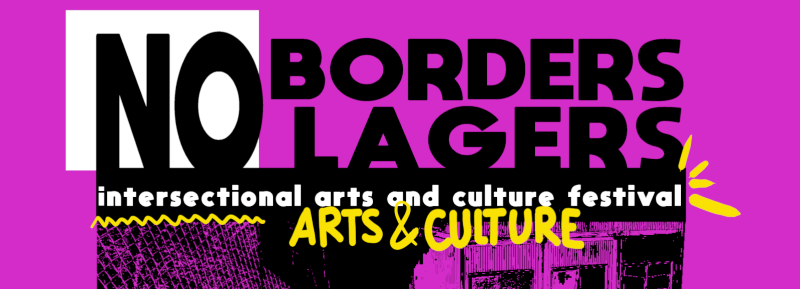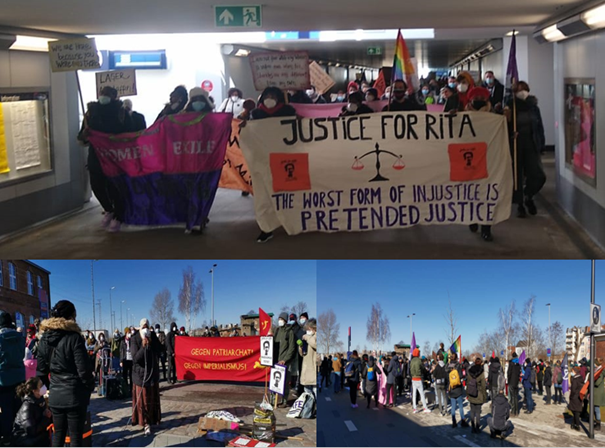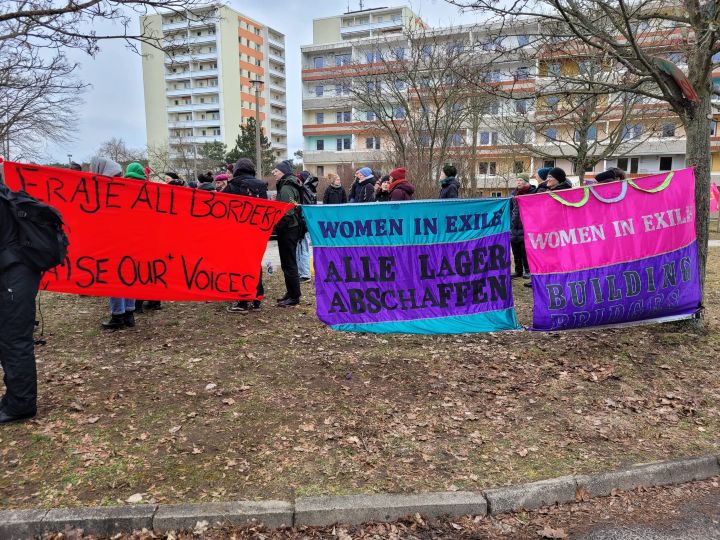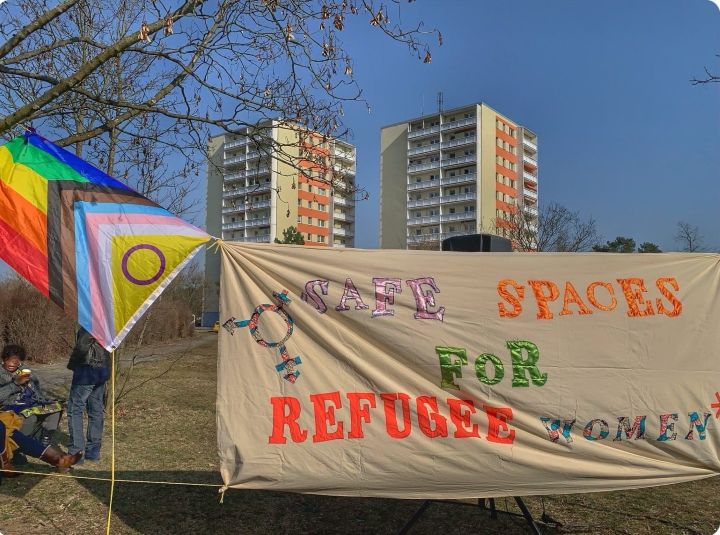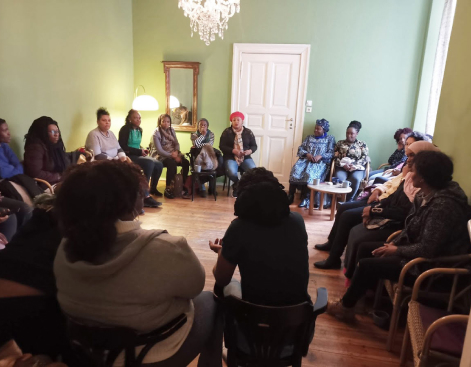To keep the rhythm of our annual summer events in our Breaking Borders to Build Bridges theme, this summer we continue to weave our networks with feminist, antiracist, anticolonial groups and we invite international and local activists and artists to our intersectional empowerment art and culture festival.
Especially in these times of right-wing populist policies, where racist asylum laws and deportation plans are being passed by the government, and racism and repression are on the rise in society, we will not let ourselves be defeated! Our “NO BORDERS_ NO LAGERS” festival is a celebration of diversity, inclusivity and empowerment through the medium of art and culture. For three days, you will have the opportunity to participate in a variety of performances, workshops, discussions and actions led by local and international guests.
In collaboration with the artist collective House of Kal, we are creating an exhibition on queer perspectives in and on the archives of Women in Exile, which will be on display at Oplatz. Our festival is a platform to hear the voices of BIPoC women* and queers, share stories and bring communities together. Together, let’s celebrate diversity, promote understanding and empower each other through the power of arts and culture.
Description of Activities:
Workshops:
- Antira-Festival Action Days Zürich – How to connect struggles?
- Indigenous Interventions to Climate Justice as an Economical Empowerment.
- Challenges and concerns for the political and civic participation of refugee women* -Brava Bern.
- Importance Raising awareness on women’s rights in Africa.
- Arts workshop “Future imaginations” to create a mock-up of a future city where the women would like to live.
- Street art and antiracist interventions workshop-presentation.
- Network against femicide – Presentation of the Kurdish Women’s Office for Peace and getting connected.
- Experiential and practical workshop: “Rhythms by ear” Traditional Dominican black percussion”.
- Legal workshop + counselling
Creative Arts Workshops:
Banner making, collective draft of the Mural, Screenprinting
Panel Discussions:
1. Panel discussions on Germany and EU policies on Refugees:
GEAS (Lea Reisner – Linke), Bezahltkarte (Zadia – Nina Hamburg), Lagers (Bethi, Rosa , EU border politics (Seebrücke/ Lolo – Alarmphone) and the impact on queer refugee – Stage
2. Intersectional Panel: Celebrating Diversity, Inclusivity and Empowerment Casa Kuà, FLIT Solidarity Africa (Munich), Nina Hamburg and Respect
Stage Events:
Dance performances
Theatre
Exibition:
Archives of Women in Exile Work
Description of the Workshops
1. Antira-festival action days (Zurich):
Since four years we organise in Zurich the enough action days (www.aktionstage-enough.ch). We asked ourselves, how to bring different struggles together, how to intervene into the public debate and what is needed, for different people and communities to attend & connect? In this workshop, we want to discuss our experiences with the ones present and invite everybody, to bring their own experiences with you. We present different aspects around the «enough action days», in particular experiences, approaches, starting points. We try to reflect, what has worked and what has not. This is followed by an open exchange with groups or organisations that are involved in similar initiatives, facing similar questions, e.g. how to reach people outside the bubble but still keep a radical approach, and how to find a good mix between information sharing and to intervene in the discourse or the public with the same event? Let’s share best practices and challenges from different contexts.
2. Indigenous Interventions to Climate Justice as an Economical Empowerment – Impact Kenya: Climate justice issues are a global concern, that have disrupted the ordinary, however global south communities are disproportionately affected given the existing poverty and vulnerability levels. Statistics from International Energy Agency, shows that Africa as the second largest continent only contributes less than 4% of global emission and zero in historical emissions. The climate summit promises have not been fulfilled to support mitigation and adaptation mechanisms for vulnerable communities hard hit by the effects of climate change. To bridge inequality gaps, we support women to engage in nature-based enterprises which leads to economic empowerment. Women are able to produce products for home consumption and small-scale business that support other household needs, such school fees, health and participation in village saving and lending of finances.
3. Challenges and concerns for the political and civic participation of refugee women* -Brava Bern:
Refugee women are often invisible and do not have the rights to which they are entitled. Their women-specific needs are often forgotten in asylum procedures, accommodation, care and integration measures. In public debates and politics, people often talk about refugees, but rarely with them. Refugee women hardly have the opportunity to voice their concerns to a wider public. Many are very isolated in everyday life – whether in asylum centres or in places of residence where they are poorly networked. As a result, the voices of these women often go unheard and their needs and demands are rarely taken into account in public discussions and political agendas.
4. Importance Raising awareness on women’s rights in Africa: – (Hane Marie – Senegal/France)
The current situation of women’s rights in Africa is a matter of concern, with particular reference to progress and persistent constraints. The Maputo Protocol and the African Charter on Human and Peoples’ Rights are two legal bases for the protection and preservation of women’s rights. Then there are the national implementation mechanisms, despite this, the effectiveness of women’s rights in Africa is far from being achieved. This is due to a number of factors, including illiteracy, a lack of awareness on the part of social players, and the weakness of concrete initiatives taken by African states.
The impact of women in the diaspora as role models of emancipation and success for young girls on the continent:
– In terms of exposure of talented young girls to the career opportunities available to them.
– Raising awareness and supporting young women on the continent.
– Making them aware of the hazards of life abroad.
– Find future ways together on how to enable women to enjoy their rights because these are rights, they already have, but which society denies them.
5. Centre Kine´ Diop/ Nit Tekna Logik Senegal – to create a mock-up of a future city where women* would like to live. (Senegal):
We are witnessing a kind of global meltdown, from climate change to the crisis of representative democracies, the intrusion of technology into people’s private lives, fake news and war. There are no articulated responses to this global collapse that can show a clear way forward.
In this workshop, we want to create a space where we can reflect, through the use of plastic arts, on how the future of the cities can look like, from urbanism, to governance or economy, so the aim is to materialise this possible future imaginations in different mock-ups.
We believe that future imaginations must be the product of collective and open collective and open processes that include artistic practices and are part of the where diversity and social wealth are brought together.
6. The street art and anti-racist interventions workshop-presentation: “Tejiendo en Armonía“ – Dominican Republic:
Share through a conversation personal experiences and details about the creative and action process. Talk about general steps of the process so other collectives can experiment with them and also share info about the risks, perks and limitants of these actions.
The participants will decide on either, to create a video-recorded performance together, that can later be shared on all our social media accounts. Or creating a piece-manifesto that can be useful for future interventions where we participate, together or individually, and we can read it.
7. Presentation of the Kurdish Women’s Office for Peace – the network against femicide:
Cenî, the Kurdish Women’s Office for Peace, works to strengthen international solidarity among women for peace processes in Turkey and Kurdistan, in the Middle East and worldwide. Women’s liberation is both the goal and the condition for this commitment. For us peace means not only the absence of war but also the abolition of all forms of oppression. Cenî is part of a supra-regional network against feminicide, whose origins, aims and practice we will present in the Berlin Network against Feminicide.
Together we will examine the conditions under which women are threatened by femicide. We want to find answers how we can protect ourselves from femicide and what conditions we need to change in order to combat fear, resignation and adaptation and to be able to assert our common life, our ways of life and our knowledge. Let’s talk about our definition of femi(ni)cide and our resistance in the workshop!
8. About Failin de Cruz (Brujx Cimarronx)’s workshop:
Experiential and practical workshop: “Rhythms by ear” Traditional Dominican black percussion “
A workshop of experiential exploration of the sound and rhythmic culture of palo music through the body and other elements of space that we can use for practices such as cans, pots, etc. It is a workshop based on the sound experience of the Puente Rolón community and its ear paleros, based on the cultural importance of this form of musical expression in this community. Each person is encouraged to participate actively and practical learning through direct experience with the instruments. – Generate a space for reflection and dialogue about the cultural and social importance of traditional music. We will learn about palos music, its distinctive rhythms, and its connection to identity and resistance.
9. Free and independent legal advice for refugees and migrants: Refugee Law Clinic
DESCRIPTION OF THE PANEL DISCUSSIONS
Panel discussions on Germany and EU policies on Refugees:
Refugee politics in Germany and the EU are becoming more and more precarious. Out-dated policies such as paying with cash instead of cash are in operation. The EU decision on the new GEAS guidelines locks refugees in detention camps at Europe’s external borders. Deportations, racism and discrimination are populars policies, refuge and protection are now strange words. The refugees as usual are the scapegoats, the easiest target to blame for all the problems in the society, because they have nor the right to vote, neither the votes.
Experts from Seebrücke, NINA HH, Seawatch, Alarm phone and the Left-party candidate, working with refugees stranded on borders and living in lagers, will give us an insight on their work.
Together, we want to talk about what resistance against this inhumane policy can look like.
Intersectional panel:
Celebrating diversity, inclusivity and empowerment
Casa Kuà, FLIT Solidarity Africa (Munich) and Respect
This feminist panel with anti-racist, anti-colonial and refugee women* empowerment will discuss the opening of our structures. How do our cultures, religions, beliefs and prejudices divide our struggles? How are we connected to each other and how do our struggles against racism, discrimination and sexism connect us as women* and queers?
